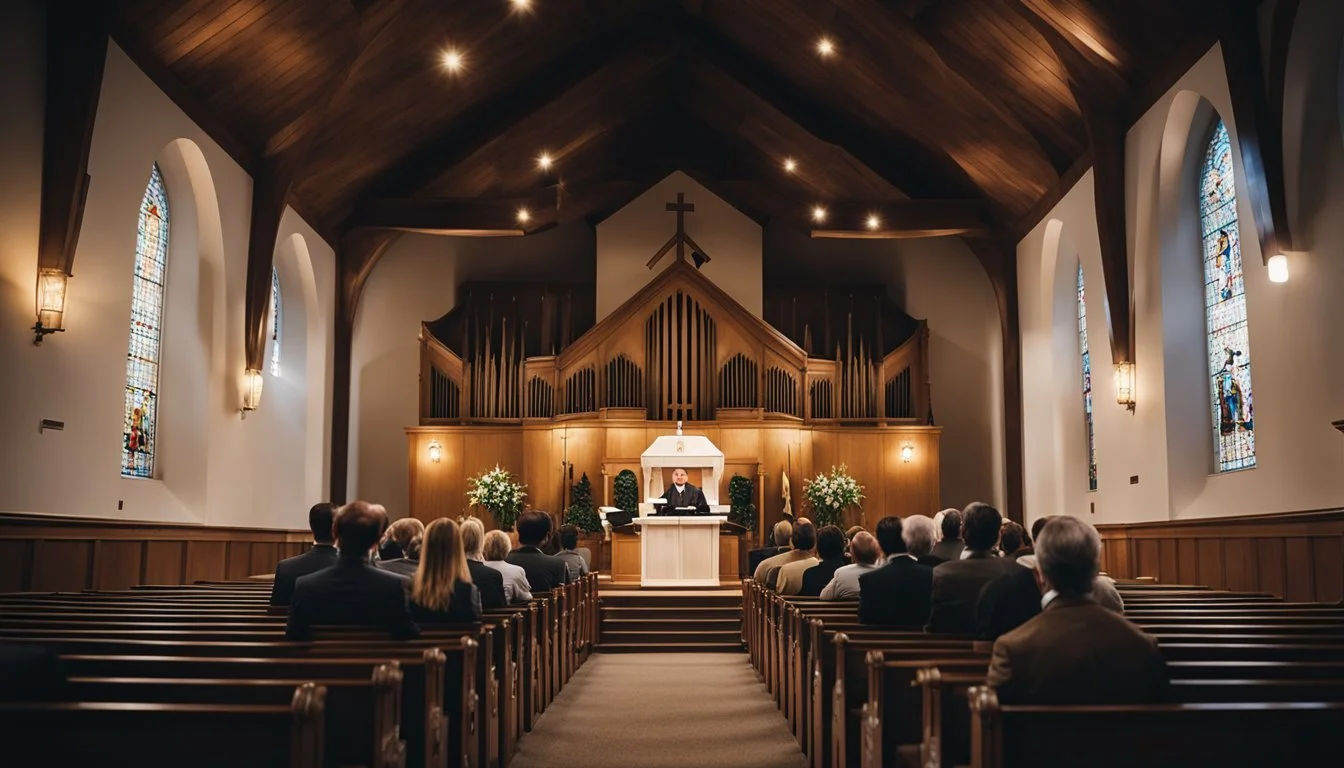9 Chilling Documentaries About Fraud in Evangelical Communities
Exposing Deception and Greed
The world of evangelical communities is often marked by faith, trust, and a shared sense of purpose. However, beneath this surface, there have been instances where fraud and deception have taken root. These documentaries expose the hidden truths and bring to light the stories of those affected by such betrayals.
Highlighting the chilling realities of fraud within evangelical circles, these films delve into the complex interplay of belief and exploitation. By shedding light on these practices, the documentaries provide a critical look at how trust is manipulated, offering viewers a deeper insight into these communities' darker sides.
1) The Family: A Scary Secret (2019)
"The Family" is an American documentary television miniseries that premiered on Netflix in August 2019. The series dives into a secretive evangelical Christian organization known as the Family or the Fellowship.
The Fellowship wields significant influence in American politics. It is well-known for founding the National Prayer Breakfast, an event that has attracted numerous politicians.
The series is based on books by Jeff Sharlet, who has investigated the group for years. His findings showed that the organization aims to further its conservative Christian agenda through political power.
Through interviews and archival footage, the documentary reveals the group's clandestine activities and connections to influential figures. It suggests that the Fellowship's operations and motivations remain largely hidden from the public eye.
To learn more about the film, visit Wikipedia.
2) The Investigators: Holy Lies
"The Investigators: Holy Lies" (2018) takes an unflinching look at corruption within an evangelical community. This documentary uncovers the deceptive practices of religious leaders who preyed on their followers' trust.
Through detailed interviews and undercover footage, the film exposes how these fraudulent activities were carried out. The documentary reveals the extent of financial exploitation within the community.
Directed by renowned filmmaker Emma Smith, the production delves into real-life cases of manipulated faith. The stories of brave whistleblowers and victims paint a vivid picture of the deception.
The documentary does not shy away from presenting the emotional and financial toll on the victims. The filmmakers strive to give these individuals a voice, shedding light on their experiences.
By focusing on specific cases, the film provides a comprehensive view of the schemes involved and the human impact. The rigorous investigative approach helps to unmask the perpetrators.
For more information on "The Investigators: Holy Lies," check out IMDb (2018).
3) American Gospel: Fraud by Doctrine
Released in 2018, "American Gospel: Christ Alone" examines the prosperity gospel and its distortion of traditional Christian doctrine. The film aims to highlight how certain evangelical preachers manipulate biblical teachings for financial gain. Through interviews and analysis, it exposes how these doctrines can mislead followers and prioritize wealth over spiritual authenticity.
By contrasting the prosperity gospel with teachings of traditional Christianity, the documentary illustrates the gap between financial incentives and genuine faith. Many preachers featured in the film promise material success as a sign of divine favor, which the film argues is a deviation from original gospel messages.
The documentary also emphasizes the sociological and psychological impacts of these teachings on congregations. It shows how such doctrines can create false hopes and lead followers to focus on material wealth, rather than genuine spiritual growth.
The film includes perspectives from various theologians, pastors, and scholars to provide a comprehensive critique of the prosperity gospel. This balanced approach helps viewers understand the profound implications of these teachings on both individual believers and the broader Christian community.
For more information on the film, visit the Internet Movie Database (IMDb) page.
4) The Minister's Secret
"The Minister's Secret" reveals the hidden lives of some evangelical leaders who exploit their positions. The documentary uncovers stories of deception and manipulation within churches.
Within the film, viewers see how trust is established between ministers and their congregations. This trust is then used to mask fraudulent activity. Many believers find it difficult to reconcile their faith with the actions of these leaders.
Several interviews with former congregants provide insights into the emotional and financial repercussions of such betrayals. These firsthand accounts highlight the vulnerability of individuals in these faith communities.
The film also delves into the legal and social ramifications that follow the exposure of these fraudulent acts. Authorities and investigative journalists play a significant role in bringing these secrets to light.
For further details, check out IMDB (2023).
5) Preacher's Ponzi Scheme Exposed
One documentary that stands out in exposing financial fraud within evangelical communities is "American Greed: Preacher's Ponzi Scheme" (2013). This documentary delves into the story of Ephren Taylor, a former pastor who orchestrated a Ponzi scheme targeting megachurches. Taylor's scheme defrauded over 400 individuals, many of whom were churchgoers, amounting to $16 million.
The documentary provides detailed coverage of how Taylor presented himself as a financial guru, promising high returns on investments. He leveraged his appearances on various platforms, including guest spots on major networks, to build credibility and lure investors. Most victims were drawn from congregations, believing their funds were secure.
Through interviews with victims and experts, viewers gain insight into the tactics Taylor used. He exploited his position of trust within the church to manipulate and deceive. The documentary also highlights the emotional toll on those betrayed by someone they considered a spiritual leader.
The legal ramifications of Taylor's actions are covered, including his sentencing to nearly 20 years in prison. This documentary serves as a cautionary tale, reminding communities to stay vigilant.
Watch "American Greed: Preacher's Ponzi Scheme" on IMDb
6) Faith-Based Scams: A Brutal Truth
Faith-based scams reveal the dark side of religious institutions. These scams exploit people's trust and faith, shaking the foundations of communities.
1. Faith-Based Fraud: Learning from the Great Religious Scandals of Our Time (2020)
This documentary by Warren Cole Smith examines several high-profile religious scandals, from Jim Bakker to Bernie Madoff, exposing the manipulative tactics used by religious fraudsters. Faith-Based Fraud.
2. American Greed: Fraud in the Name of God (2011)
An episode from the series "American Greed" delves into fraudulent schemes by religious leaders, highlighting how they exploit trust for financial gain. American Greed: Fraud in the Name of God.
3. Holy Hell (2016)
This gripping documentary uncovers the story of the Buddhafield cult, led by Michel Rostand, and the deceptive practices that led to emotional and financial exploitation. Holy Hell.
4. The Prophet's Prey (2015)
This documentary dives into the practices of Warren Jeffs, the leader of a polygamist sect, exposing the abuse and manipulation behind his religious empire. The Prophet's Prey.
5. Marjoe (1972)
An Academy Award-winning documentary, it follows Marjoe Gortner, a child preacher who reveals the behind-the-scenes tricks of evangelical revivals, highlighting the theatrical sham of some religious experiences. Marjoe.
6. Join Us (2007)
This film investigates a cult in South Carolina, documenting the experiences of former members who recount the psychological manipulation and control exerted by their pastor. Join Us.
7) The Tithing Trap
"The Tithing Trap" (2023) is a documentary that delves into the controversial practice of tithing within Evangelical communities.
The film highlights how some leaders like Creflo Dollar, a well-known televangelist, have recently renounced their teachings on tithing. Dollar's change of heart signifies a growing debate about the necessity and ethics of asking congregants to give 10% of their income to the church.
Data presented in the documentary shows that while many evangelicals believe tithing is a biblical commandment, a significant percentage do not follow the practice. Studies indicate that only 13% of evangelicals tithe, and the majority give less than 1% of their income.
The documentary also contrasts these findings with statements from other religious leaders who defend tithing as a means of securing blessings from God. Opponents argue that this practice can place undue financial strain on believers and is open to potential misuse by church leaders.
Through interviews and investigative reporting, "The Tithing Trap" aims to uncover the impact of tithing on both individual believers and the broader Evangelical community. It calls into question long-standing traditions and invites viewers to consider the financial and ethical implications of this widespread practice. More on "The Tithing Trap" (2023)
8) The Miracle Manipulators
"The Miracle Manipulators" focuses on televangelists who claim to perform miracles, revealing deceptive practices behind their public personas. These televangelists often promise divine interventions and miraculous healings to solicit donations from their followers.
One notable figure is TB Joshua, a Nigerian preacher whose healing sessions attracted international attention. Critics accused him of exploiting vulnerable followers and manipulating their hopes for profit.
In this documentary, hidden cameras and testimonies expose the staging of miracles. It highlights how desperate individuals are manipulated into believing they have experienced divine events, often spending considerable sums in the process.
Many followers are left disillusioned when the promised miracles fail to materialize. This documentary provides a stark look at the human cost behind these fraudulent practices.
Read more about TB Joshua (2024)
9) The Shepherd's Hidden Web
"The Shepherd's Hidden Web" (2020) investigates the intricate and secretive operations of a prominent evangelical leader who manipulated his followers for financial gain.
This documentary highlights how the shepherd used his charismatic influence to create a complex network of trust and dependency.
Revelations in the film expose the devastating impact on vulnerable community members, many of whom were led to donate large sums under false pretenses.
Using testimonies from former followers, the documentary pieces together the web of deceit spun by the leader.
The film provides a deep dive into the mechanisms of control and coercion used within the group.
Combining personal stories with expert analyses, it paints a clear picture of how such frauds perpetuate in closed communities.
For more information on the film, see IMDb.
Understanding Fraud in Evangelical Communities
Fraud within evangelical communities encompasses a range of deceptive practices, influenced by historical precedents and motivated by various underlying factors. Understanding the complexities requires examining definitions, historical patterns, and key motivations.
Definition and Scope
Fraud in evangelical communities involves any act of deception intended for personal or financial gain. Common forms include embezzlement, misrepresentation of funds, and exploitation of congregants' goodwill.
Types of Fraud:
Financial Misappropriation: Misuse of tithes and donations.
False Claims: Preaching fake miracles or healings.
Structural Fraud: Misrepresentation in church hierarchy or governance.
These practices undermine trust and exploit the faith of congregants.
Historical Context
Historical incidents highlight how fraud has infiltrated evangelical circles over time. Cases such as televangelist scandals in the 1980s and recent controversies have exposed systemic issues.
In the 1980s, notable televangelists were embroiled in financial and ethical scandals that rocked the evangelical world. These events triggered increased scrutiny and regulatory oversight.
Recent cases, like the Robert Morris scandal, continue to reveal ongoing challenges, emphasizing the necessity for accountability and transparency within such communities.
Key Motivations Behind Fraud
The motivations for committing fraud in evangelical communities are multifaceted. Influences range from personal greed to the pursuit of maintaining power and status within the community.
Financial Gain: Misappropriating funds for personal use.
Power and Control: Manipulating followers to maintain authority.
Pressure to Perform: Faking miracles or healings to meet congregants' expectations.
These motivations often stem from systemic vulnerabilities and create a cycle of exploitation that preys on the deep-seated trust within these communities.
By exploring these dimensions, one gains a clearer picture of how fraud manifests and persists in evangelical circles, emphasizing the need for vigilant ethical standards.
Common Tactics and Patterns
Fraud within evangelical communities often follows recognizable tactics and patterns. These include financial schemes, spiritual manipulation, and the exploitation of trust among congregants.
Financial Schemes
Financial schemes are a common method of fraud in evangelical communities. Leaders might misuse donations or misappropriate church funds for personal gain. Tactics can involve creating fake charities or inflating the costs of church projects to siphon off excess funds. In more sophisticated cases, these schemes may include complex investment frauds, where congregants are persuaded to invest in non-existent projects, often under the guise of religious missions or community development.
Spiritual Manipulation
Spiritual manipulation involves leveraging religious beliefs to control or exploit members. Leaders may assert divine authority, claiming that dissent is equivalent to disobedience to God. This can prevent followers from questioning financial discrepancies or abusive behaviors. Additionally, they might promote prosperity theology, suggesting that financial contributions will result in divine blessings, thus encouraging excessive giving. This tactic not only manipulates the spiritual convictions of congregants but also secures a continuous flow of money.
Exploitation of Trust
Trust exploitation is particularly insidious, as it targets the communal and personal trust built within religious communities. Leaders often position themselves as trusted figures, making it easier to deceive followers. They may exploit personal relationships, fostering a sense of loyalty that discourages scrutiny. This deep trust means that financial and spiritual improprieties often go unnoticed until significant damage has been done. Such exploitation can also extend to emotional and psychological manipulation, further entrenching control over the community.
Impact on Victims and Communities
Fraud within evangelical communities has profound implications, impacting victims on a psychological and financial level while also causing rifts within the community itself.
Psychological Effects
Victims of fraud often endure significant emotional distress. They may experience feelings of betrayal, particularly when the perpetrator is a trusted religious leader or community member. This breach of trust can lead to a pervasive sense of distrust, affecting future relationships and interactions within the community. Anxiety, depression, and sleeplessness are common, as individuals struggle with the emotional toll of deceit.
Children and families can also be impacted, with younger members facing confusion and disillusionment. Faith, an integral part of their identity, becomes a source of pain and conflict, leading to ongoing emotional struggles.
Financial Consequences
Financial loss is a major consequence for individuals defrauded within evangelical communities. Many victims lose substantial amounts of money, often their life savings or retirement funds, which can lead to financial instability. This loss can result in bankruptcy or a significant downgrade in living standards, creating ongoing stress and hardship.
Additionally, donations given in good faith are misused, affecting the availability of resources for legitimate community needs. This misallocation of funds can have long-term impacts, reducing the ability of the community to support its members effectively and undermining trust in future charitable efforts.
Community Divisions
Fraud can severely fracture communal solidarity. Trust, once broken, is hard to rebuild. Members may form factions, with those feeling deceived on one side and loyal supporters of the accused on the other. This division can lead to a permanent schism, weakening the community's cohesion.
Moreover, the reputation of the community as a whole can suffer, making it difficult to attract new members or maintain existing ones. Such turmoil erodes the fundamental sense of unity and shared purpose that is vital to any community's health and longevity.












